 Viganò releases new ‘testimony’ reacting
Viganò releases new ‘testimony’ reacting
to Pope’s silence on McCarrick cover-up
Challenges Cardinal Ouellet, who told him of B16 sanctions
against McCarrick, to show relevant documents
by Diane Montagna

ROME, September 27, 2018 (LifeSiteNews) — Archbishop Carlo Maria Viganò has today issued a new extraordinary testimony, responding to Pope Francis’S refusal to answer the charge that he knew of Cardinal Theodore McCarrick’s sexual abuse, yet made McCarrick “one of his principal agents in governing the Church.”
In the four-page document (see below), the former Apostolic Nuncio to the United States also responds to the Pope’s recent homilies which seem to cast himself in the role of Christ and Viganò as the diabolical “Great Accuser.”
“Has Christ perhaps become invisible to his vicar? Perhaps is he being tempted to try to act as a substitute of our only Master and Lord?” Archbishop Viganò asks in the new statement, sent to LifeSiteNews today.
Given the symbolic date of September 29, the liturgical feast of St. Michael the Archangel, and bearing the Archbishop’s episcopal coat of arms and motto, Viganò:
- explains why he believes he had a duty to come forward despite his oath to keep the “pontifical secret,” adding that “the purpose of any secret, including the pontifical secret, is to protect the Church from her enemies, not to cover up and become complicit in crimes committed by some of her members”;
- restates with vigor his central charge that “since at least June 23, 2013, the Pope knew from me how perverse and evil McCarrick was in his intentions and actions, and instead of taking the measures that every good pastor would have taken, the pope made McCarrick one of his principal agents in governing the Church, in regard to the United States, the Curia, and even China, as we are seeing these days with great concern and anxiety for that martyr Church”;
- points to the Pope’s initial response that he would “not say a word” but then notes that he contradicts himself, in comparing “his silence to that of Jesus in Nazareth and before Pilate,” and Viganò to “the great accuser, Satan, who sows scandal and division in the Church, though without ever uttering my name”;
- raises concern over revelations that Pope Francis played a role in covering up for or blocking investigations into other priests and prelates, including Fr. Julio Grassi, Fr. Mauro Inzoli, and Cardinal Cormac Murphy-O’Connor; and
- says it was Cardinal Marc Ouellet, prefect of the Congregation for Bishops, who told him of Pope Benedict’s sanctions against McCarrick.
Addressing the Cardinal, he writes:
“You have at your complete disposal key documents incriminating McCarrick and many in the curia for their cover-ups. Your Eminence, I urge you to bear witness to the truth...”
“My decision to reveal those grave facts was for me the most painful and serious decision that I have ever made in my life,” Viganò writes. “I made it after long reflection and prayer, during months of profound suffering and anguish, during a crescendo of continual news of terrible events, with thousands of innocent victims destroyed and the vocations and lives of young priests and religious disturbed.”
“The silence of the pastors who could have provided a remedy and prevented new victims became increasingly indefensible, a devastating crime for the Church,” he writes.
“Well aware of the enormous consequences that my testimony could have, because what I was about to reveal involved the successor of Peter himself, I nonetheless chose to speak in order to protect the Church, and I declare with a clear conscience before God that my testimony is true.”
In the statement, Archbishop Viganò also encourages the faithful to “never be despondent!” Exhorting them, he writes:“Make your own the act of faith and complete confidence in Christ Jesus, our Savior, of Saint Paul in his second Letter to Timothy, Scio cui credidi, which I choose as my episcopal motto. This is a time of repentance, of conversion, of prayers, of grace, to prepare the Church, the bride of the Lamb, ready to fight and win with Mary the battle against the old dragon.”
Here below is the official English text of Archbishop Viganò’s new testimony.
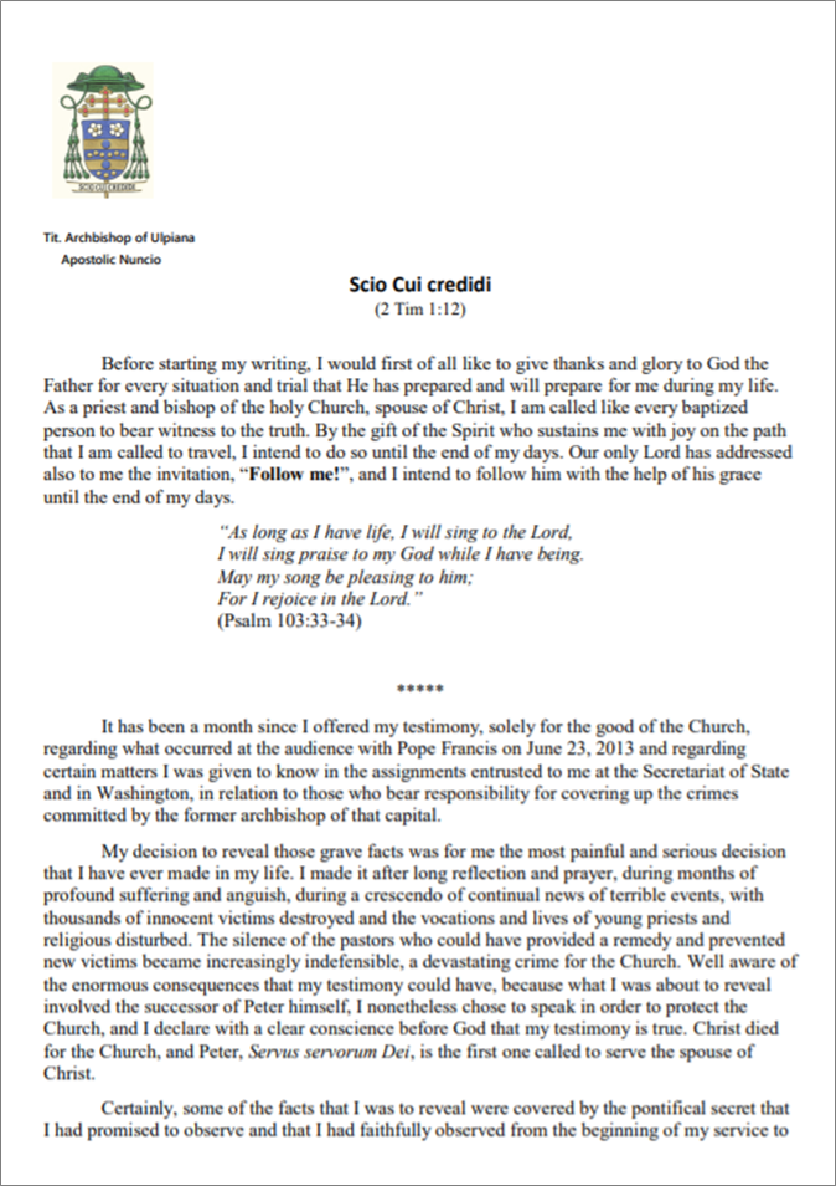
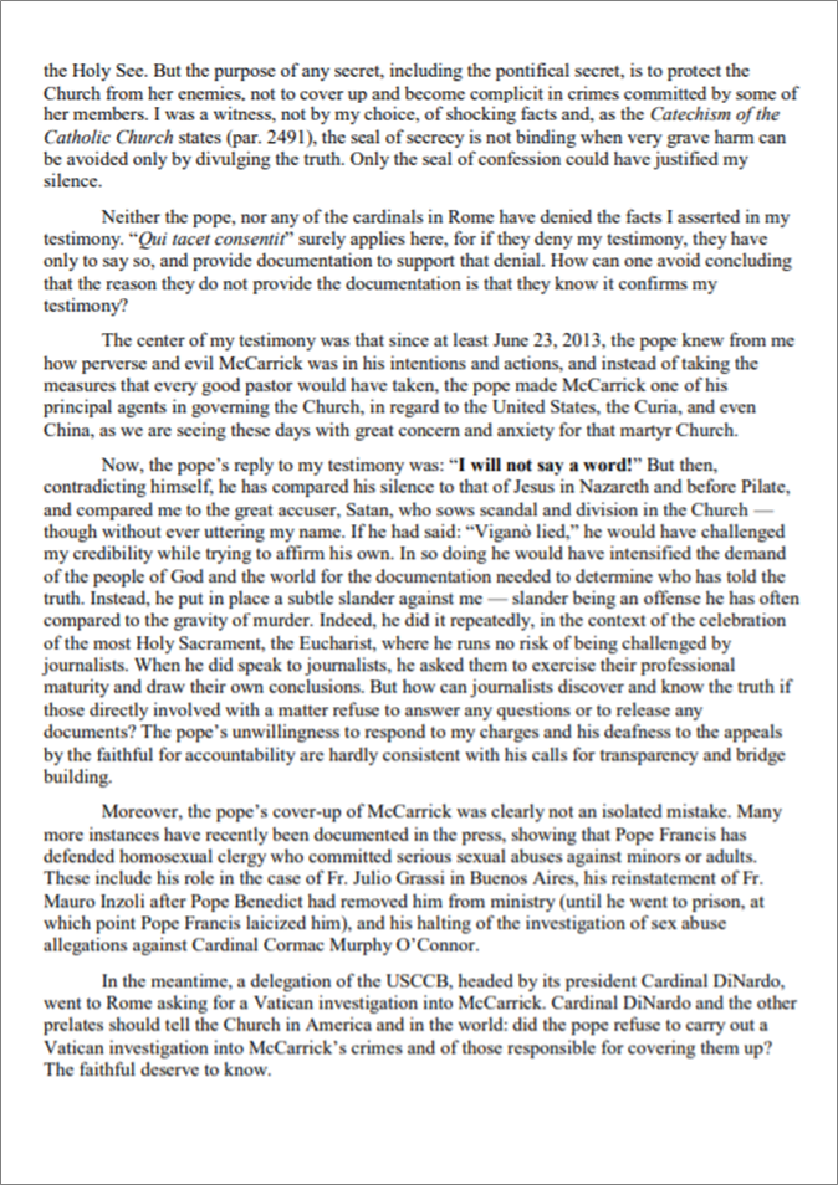
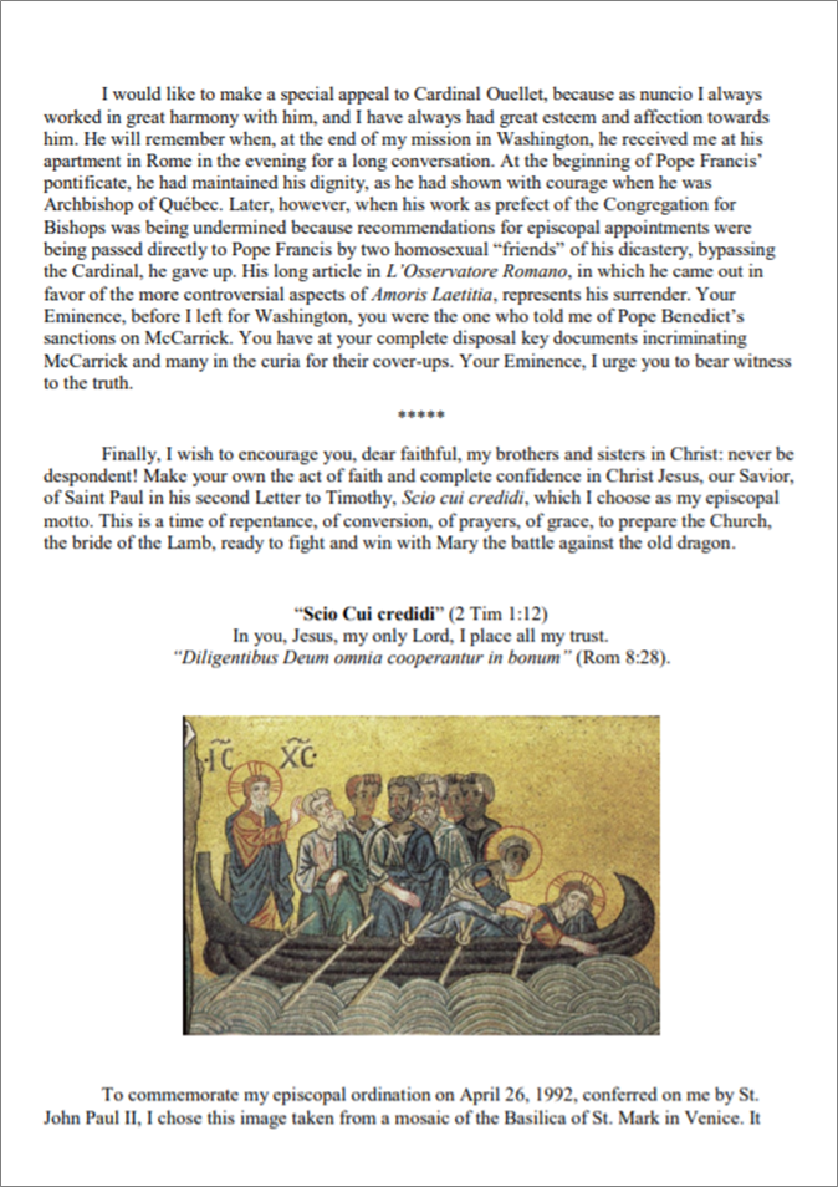
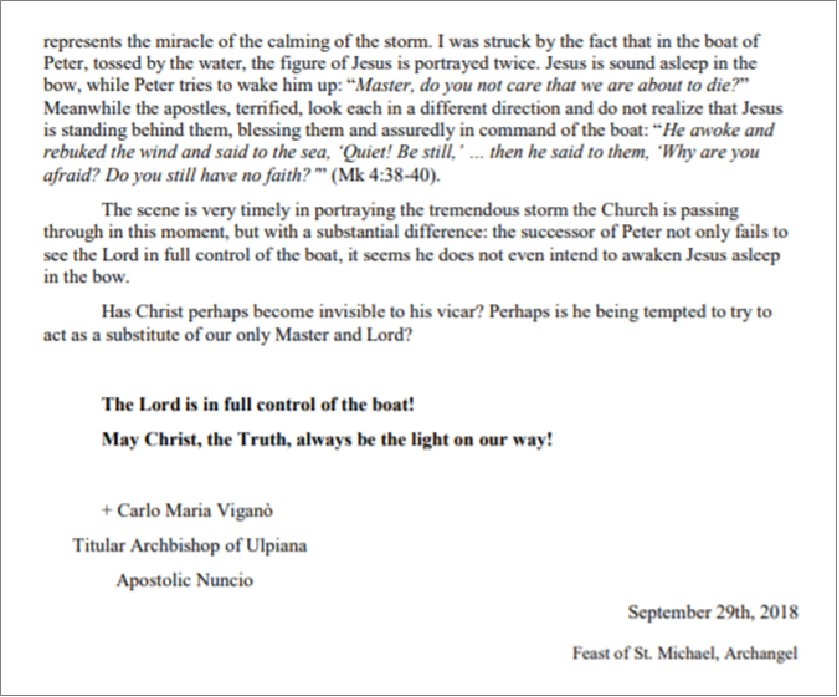 Marco Tosatti on his blog comments on the involvement of Cardinal Ouellet, who as Prefect of Bishops, would have had the very same files, if not more, than his predecessor, Cardinal Re had when the latter informed Vigano earlier about the McCarrick sanctions. Vigano has challenged Ouellet to make those documents known. My translation:
Marco Tosatti on his blog comments on the involvement of Cardinal Ouellet, who as Prefect of Bishops, would have had the very same files, if not more, than his predecessor, Cardinal Re had when the latter informed Vigano earlier about the McCarrick sanctions. Vigano has challenged Ouellet to make those documents known. My translation:
I don't believe Ouellet will do it (release the documents). He has been substantially deprived of powers as Prefect of Bishops (under this pope). Shortly after Bergoglio's election, he nominated to be Secretary of the Congregation [i.e., its number-2 man] - and consecrated as bishop - someone who had been a mere functionary, Ilson de Jesus Montanari, a great friend and longtime intimate to the Argentine priest Fabian Pedacchio Leaniz, who became Bergoglio's private secretary but anomalously retains his position at the Congregation [where he served for a long time as Bergoglio's 'eyes and ears in Rome]. [i.e., Ouellet, like Cardinal Bagnasco when he was still president of the Italian bishops conference, was assigned a Bergoglio minder as his #2 man (for Bagnasco, it was the infamous Mons. Galantino) whose function is really to keep the top man under vigilance and control.]
The absolutely extraordinary appointment of Montanari was necessary to a total expropriation of the Congregation for Bishops as to the approval of bishops' appointments. One must recall an episode that ha been widely reported concerning the appointment of a Canadian bishop:
Three names were discussed [the usual terna, or short list of 3, that the Nuncio submits as the top candidates for a post]. Ouellet, who is Canadian and knew one of the candidates quite well, said immediately, "This person will not do, this second candidate is good, but the third one is the best". It appears that Ouellet's objection was based on morality-related issues. In the light of what has been happening in this pontificate, we can imagine this 'bad' candidate' must have had friends in high places in Rome.
Because the next day, Leaniz arrived at the Congregation to say, "The pope wants him" - precisely the man Ouellet had ruled out... Ouellet had no choice but to swallow the toad and to go on toadying to his lord and master the pope, hoping to remain in place (he was appointed in 2010) long enough to be papabile once more in the next conclave. [But Ouellet - whom I would have accepted readily if he had been elected pope in 2013 (fool that I am, in hindsight) - almost immediately began toadying to Bergoglio while denigrating Benedict XVI (this I minded very much: let him toady all he wants, but why at the expense of B16?] And he has just slid downhill very fast - being among the most passionate defenders of Amoris laetitia, and of everything else Bergoglio has said, done and decreed.]
Meanwhile, John Allen tries to bend backward as far as he can to 'soften' his critique of the reigning pope and what Allen himself calls his 'trust deficit'. But even a Bergogliac like Allen can't really hack out a plausible defense for their idol in the face of mounting evidence.
Both on China and the abuse crisis,
Pope Francis faces a trust deficit
by John L. Allen Jr.
Editor

Sept 27, 2018
ROME - Five days after announcing a landmark deal with China over the appointment of bishops, Pope Francis released a letter to Chinese Catholics on Wednesday. The gist of it amounts to, “Trust me.”
Specifically, Francis asked the roughly 13 million Catholics in China to “place your trust ever more firmly in the Lord of history and in the church’s discernment of his will.”
The idea is to ask for faith despite whatever uncertainty Chinese Catholics may be experiencing, especially those of the “underground” church who have been tenacious in their opposition to the Communist government out of loyalty to Rome and now feel like the rug has been pulled out from under them.
One core reason the pope needed to appeal for trust is that while a deal has been announced,
few details of what precisely it contains are known. Thus it’s impossible to say at this stage exactly how much freedom of movement the pope has sacrificed in order to get the Chinese authorities to sign on the dotted line, or what its implications may be for the future of the faith in China.
In some ways,
the situation isn’t entirely dissimilar from the approach Francis has taken on the charges leveled a month ago by Italian Archbishop Carlo Maria Viganò, a former papal ambassador in the US, that Francis knew of sexual misconduct charges against ex-Cardinal Theodore McCarrick in 2013 and failed to act.
When those charges first arose, Francis refused to address them, and essentially did so again Monday night during a new conference aboard his plane returning to Rome from a four-day trip in the Baltics.
Francis declined to respond to any question that wasn’t specifically related to the trip, although he did volunteer some thoughts on the clerical abuse scandals - among other things, arguing that the Pennsylvania grand jury report released in mid-August shows progress in the Church’s fight against child abuse, since the number of cases from recent years is dramatically lower than the 1960s, 70s and 80s.
However, the pope didn’t say a word about Viganò’s allegations, nor did he answer the obvious question journalists aboard the plane really wanted to ask: Will he order the disclosure of records showing what the Vatican knew about the McCarrick case, and when it knew it?
[I still do not understand what keeps a journalist from following up on a question the pope refuses to answer. At least go on the record that you did not just give up! They can't throw you off the plane then and there for doing that. (Though you probably won't ever again get invited to be on the papal plane, or God knows what other punishment may await you!) Or why don't all the journalists on the papal plane tell Greg Burke: "If the pope does not want to answer any question that's not about this trip, then let's just not have a news conference at all!" It's not as if the world is waiting with bated breath to see what earthshaking news may have happened - unlikely as that is - behind the scenes during his trip to the Baltic nations!]
In other words, here too the pope is basically asking people to trust him.
In some ways, it’s an understandable request. From the beginning of his papacy, Francis has shown himself to be a friend of victims, underdogs and oppressed peoples everywhere, and to have a keen pastoral heart for those shoved to life’s peripheries. It’s thus perhaps not unreasonable for him to think that he could rely on a certain benefit of the doubt. {C'mon, that's a load of Bergogliac BS, and you know it, Allen!]
The problem he faces, however, is two-fold.
First, Francis suffers from an institutional trust deficit that didn’t begin with him, but he inherited it and it’s part of his reality. Underground Catholics in China often feel the Vatican has betrayed them repeatedly since the era of Paul VI, while abuse survivors have long experience of hearing declarations of resolve from church leaders only to be disappointed when it comes to follow-through.
Moreover, both constituencies are feeling a little ambivalent about Francis himself these days, wondering if despite the new tone the underlying music from the Church really hasn’t changed that much.
In other words, Francis is dealing with two groups for whom a plea of “trust me” from any Church leader, even him, is especially hard to swallow.
Perhaps even more basically, as the saying goes,
trust is a two-way street. If Francis or any leader wants public trust, once in a while they have to be prepared to take the kinds of steps that earn it.
If Francis is looking for somewhere to begin right now, he might consider transparency - a word that’s been frequently invoked as a goal of his reforms, but a practice that sometimes seems more honored in the breach than the observance on his watch.
If Francis wants the trust of Chinese Catholics, he might consider telling them what exactly they’re being asked to trust him about - in other words, the content of the new deal the pontiff has inked with the Chinese government.
Once Catholics know how the deal is structured, what’s been given away and what’s been maintained, they might be more inclined to withhold judgment until they see how it works out on the ground.
Similarly for abuse survivors, if they saw Francis committed to getting to the bottom of what went wrong in cases such as McCarrick’s, and having sufficient faith in the Catholic rank-and-file that coming clean won’t destroy their faith or shatter whatever illusions remain, they might be willing to give the pope a bit more breathing room as he tries to figure out a path forward.
Transparency, in other words, isn’t just a “best practice” in both avoiding and remedying scandals, though it certainly is that. It’s also a down payment on trust - a payment that can’t just be made once, but regularly, like gas and water, because otherwise the service gets turned off.
Both on China and on sex abuse, making that payment may be costly for Francis and his Vatican team, but experience may prove that doing is no longer a luxury but a necessity. [That'a more like it, Mr. Allen. Attaboy!]
I'm surprised at Phil Lawler's conclusion about the following report. So they're grumbling. That's all it will ever amount to. I wish I could share Lawler's optimism...
Grumbling among Vatican journalists
about Bergoglio's stonewalling:
An ominous development for the Pope
By Phil Lawler |

September 26, 2018
Pope Francis gave his usual in-flight press conference on Tuesday, as he returned from a visit to the Baltic region. But the Pope did not make any shocking statements. Instead, reporters were mumbling about what the Pope didn’t say.
Pope Francis didn’t answer questions about sexual abuse.
After fielding several questions from reporters about his time in the Baltics, the Pope was asked by an Austrian reporter about a statement he had made in Estonia, about responding to sexual abuse. The Pontiff said that he would not answer the question at that moment; he wanted more questions about his trip.
But he did promise to address the issue, saying “it will be the first question after the trip.” [Oh yeah? Like when?]
One more question followed, about Lithuanian immigration. Then the papal spokesman, Greg Burke, acknowledged that there were no more questions about the trip. Rather than answering questions about the abuse issue, the Pope addressed it himself, in the course of a lengthy, rambling statement.
After touching on other topics,
a) he said that
things are much better than they once were, and the grand-jury report in Pennsylvania reflected “the way of thinking in previous times…”
b) He assured reporters that
he had never offered leniency to a priest who was convicted of sexual abuse by the Congregation for the Doctrine of the Faith. [LIE! What about Fr. 'Mercedes' Inzoli????]
If the Holy Father had allowed questions on the topic, an enterprising reporter might have pressed him to speak about former cardinal Theodore McCarrick, whose name he had not mentioned. Or about Archbishop Vigano, whose name was also missing from the Pope’s remarks. Or about Mauro Inzoli, who was removed from ministry by Pope Benedict XVI but restored by Pope Francis — temporarily, until new abuse charges forced his laicization. But the Pope wasn’t taking questions.
And reporters were not happy. A Twitter comment by Cindy Wooden conveyed the mood:
“Shot down by Pope Francis. He only wanted questions on the trip to the Baltic countries. I said that I had questions left unanswered since returning from Dublin. They were travel questions. But not for this trip. #frustratadi new # Viganò “ [sic]
Cindy Wooden is not a troublemaker; not a gadfly, not a sensationalist. She is the Rome bureau chief for Catholic News Service, the agency owned and operated by the US bishops’ conference. If she was giving voice to her feelings, you can be sure that other reporters felt at least equally frustrated.
Thus far in his pontificate, Pope Francis has enjoyed remarkably favorable media coverage. He has not been pressed to answer awkward questions: about the dubia, about the dismantling of the Secretariat for the Economy, about declining morale in the Roman Curia, about Chile and McCarrick and Vigano and Wuerl and Pennsylvania and Germany. But now reporters are grumbling.
[COWARDS ALL!]
 Those who criticize Vigano for his 'omissions'
Those who criticize Vigano for his 'omissions'
say nothing about the most scandalous omission of all:
The pope's failure to respond to one question
Translated from
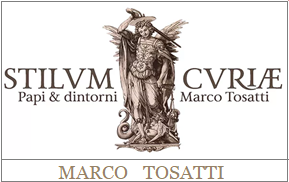
September 28, 2018
“Viganò, a new statement with the same accusations and the same omissions” is the headline on a pra-Vatican site about Archbishop Carlo Maria Viganò’s second ‘Testimony’, with
a call for ‘parrhesia, transparency, clarity and dialog’ from him. [Familiar words from Bergoglio's Casa Santa Marta tirades but which one seeks in vain for him to manifest on the questions that matter.]
Speaking of omissions, yes, there is a huge omission. As huge as the pink elephant that a Twitter habitue has posted (see banner), for which we thank him.
The omission is of course the pope’s failure to anwer Viganò’s statement on August 26, as the latter reoterates it in his Sept. 27 letter:
The center of my testimony was that since at least June 23, 2013, the pope knew from me how perverse and evil McCarrick was in his intentions and actions, and instead of taking the measures that every good pastor would have taken, the pope made McCarrick one of his principal agents in governing the Church, in regard to the United States, the Curia, and even China, as we are seeing these days with great concern and anxiety for that martyr Church.
So, is vigano’s statement true or not? All it takes is a few seconds to answer. This morning, a colleague who was interviewing me for a foreign TV network said that McCarrick’s case has spanned three pontificates and that perhaps it is because of this that we have to wait for the Vatican to make its ‘eventual and necessary’ clarifications.
Already, the choice of adjectives is diverting:
If such clarifications are necessary, how can they be ‘eventual’, meaning, perhaps there may be, or perhaps not.
But even if this were true, and the study of all relevant documents will take time
(provided these have no already been destroyed as what we know has happened to some personnel dossiers kept at the Second Section of the Secretariat of State) [we know of one such dossier that was whitewashed of anything negative – Mons Ricca’s – so that the pope could claim that the ‘investigation’ he ordered on his past turned up ‘nothing at all’], the reply to Mons Viganò’s question simply requires a few seconds.
[Fraction of a second, even, if the pope can answer either Yes or No.]
But it must be very difficult for the pope, judging from his expression when Cindy Wooden of CNS sought to ask him a question about McCarrick on the return flight from Tallinn. The photograph is an icon of embarrassment.
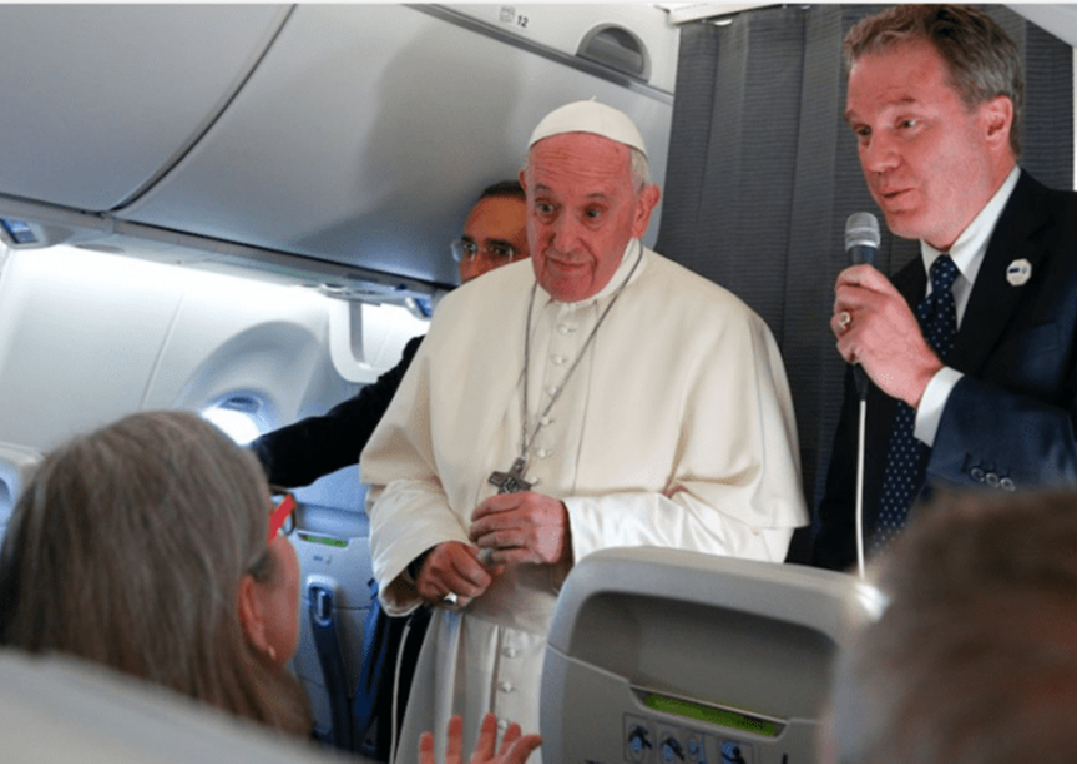
In Vigano’s new testimony released one month after the first, there are two points that I find ‘pregnant’ with significance. The first is when he says it was the most difficult decision of his life when he decided to speak out. The second was the statement that
“I declare with a clear conscience before God that my testimony is true”.
Well, we would all like to hear from the Pontiff his testimony and hear him say the same thing about it that Viganò has said about his.
And I would be happy if our other colleagues in the media – once they have exhausted all the possible motivations (conspiratorial, personal, psychological, career-driven and motives of temperament they would attribute to Viganò’s testimonies – could finally come to ask themselves, and the pope: “Is what Viganò said of his June 13, 2013 conversation with the pope true or not?
For the sake of all those Catholics who would like to know if this pope covered for and coddled, for five years, a serial predator of seminarians and young priests. That’s all we want to know.
Another commentary from an Argentine-American writer who lives in Buenos Aires...
Light shining on hidden things
Carlos Caso-Rosendi

September 24, 2018
In the last month or so, various Catholic news outlets have asked me to research the veracity of various accusations made against Pope Francis while he was Archbishop of Buenos Aires. Did he cover up wrongdoing? Was he involved in financial scandals? What was his level of collaboration, if any, with the corrupt Kirchner administration?
The German magazine
Der Spiegel, one of Europe’s most prestigious publications and generally supportive of liberal positions, found reasons to believe that
scores of abuse victims may have been kept from speaking with Cardinal Bergoglio. In addition, he seems to have taken a central role in defending at least one abuser, and perhaps others.
Der Spiegel made this claim – and several sharp complaints about ways that Pope Francis had divided the Church – in this week’s cover story, under the title:
Du sollst nicht lügen, Der Papst und die Kirche in ihrer größten Krise (“Thou shalt not lie: The pope and the Church in their greatest crisis”).
If true, these charges could provoke a greater explosion than the 11-page Testimony by the former nuncio to the United States, Archbishop Carlo Maria Viganò.
Many uncertainties, of course, surround such charges.
Given the present state of affairs in Argentina, it is hard to find unbiased answers to questions. But one thing is certain: “there is nothing hidden that will not be disclosed, and nothing concealed that will not be known or brought out into the open.” (Luke 8:17)
In fact, light is now shining on many once-hidden things.
The lack of official response and the vicious attacks on the reputation of Viganò have had a clarifying effect. Just this week Archbishop Victor Manuel Fernández, a figure very close to the pope and his sometimes ghostwriter, described Viganò as suffering from a delusional mental illness “marked by feelings of personal omnipotence and grandeur.”
He did not seem to care whether Viganò’s allegations, even if the ravings of a madman, are true.
I have the impression that we are living days like those described by St Paul in 2Timothy.
The Church – infiltrated by her enemies – is now being shaken in her very structure.
Pope Paul VI said in 1972:
“the smoke of Satan has entered the Temple of God through some crack in the wall.” Through years of surreptitious action, seducers “made their way into the household” of God and began to hold sway over the weak. Homosexuality among the clergy has now “become plain to everyone,” as honest prelates, the media, and government investigators uncover the ugly truth.
As undeniable evidence piles up, it should not surprise us if evil is exposed even in the highest echelons of the hierarchy. We should not be confounded if
“wicked people and impostors . . . go from bad to worse, deceiving others and being deceived.” We’re at a point of no return.
Not content with having introduced false pastors among the clergy, the enemy is now trying to introduce a false religion. He wants to destroy the Church by destroying the faith. He needs to replace the Catholic religion with a counterfeit version.
The false spirit of that “counterfeit faith” produces many pseudo-commandments, interfaith gestures, ceremonies, and liturgical shows of unity. There’s plenty of praise for the disobedient and the heretic “holding to the outward form of godliness” but rejecting the doctrinal truth and the sacramental integrity of the true faith.
Holy Tradition, Holy Scripture, the Catechism, and even Natural Law are attacked:
You must understand this, that in the last days distressing times will come. For people will be lovers of themselves, lovers of money, boasters, arrogant, abusive, disobedient to their parents, ungrateful, unholy, inhuman, implacable, slanderers, profligates, brutes, haters of good, treacherous, reckless, swollen with conceit, lovers of pleasure rather than lovers of God, holding to the outward form of godliness but denying its power. Avoid them! (2 Timothy 3:1-9)
This is a very dangerous time because many souls may be lost. Many may walk away, disgusted by all that filth. That is why we have to reflect on the causes of the crisis, so we can counter that evil effectively. All the lies and half-truths taught to the faithful in this age of darkness are the result of bad Catholic formation.
The first part of the devil’s attack consisted in eliminating good catechesis. For the near future, the teaching of the true faith may have to rest with a handful of people remaining loyal to God. That is why we must be busy creating ways to develop a rapid, deep, and precise knowledge of the faith.
False pastors will not deceive well-formed Catholics. In fact, the folly of those false pastors will become evident as the light of the true faith shines on their wicked ways. It is true that “they will not make much progress” because they are the “wicked servants” of Jesus’ prophetic parable.
It is up to us to keep the faith by being “good servants” minding the counsel of Christ:
Who then is the faithful and wise servant, whom the master has put in charge of the servants in his household to give them their food at the proper time? It will be good for that servant whose master finds him doing so when he returns. . . .But suppose that servant is wicked and says to himself, “My master is staying away a long time,” and he then begins to beat his fellow servants and to eat and drink with drunkards. The master of that servant will come on a day when he does not expect him and at an hour he is not aware of. He will cut him to pieces and assign him a place with the hypocrites, where there will be weeping and gnashing of teeth. (Matthew 24:45-51)
Are the accusations against Pope Francis while he was Archbishop of Buenos Aires true? All I can say is that no one can stop God from revealing the truth. Wise men will work with God, lest they end up working for the father of lies.
[Modificato da TERESA BENEDETTA 30/09/2018 03:36]